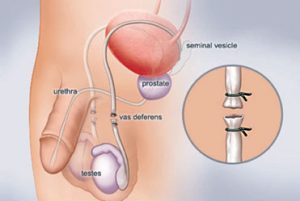
VASECTOMYCLINIC
VASECTOMY CLINIC
What is a Vasectomy
A Vasectomy is a safe and reliable method of Birth Control for Men. The simple, quick procedure has minimal complications and over the long term is much cheaper and safer than other methods of contraception.
During the procedure the tube (vas deferens) that carries the sperm from the testicle to the ejaculatory ducts, is divided, interrupting the normal route of the sperm, preventing pregnancy.
Vasectomy is very reliable - but not quite 100%. Even after a successful operation about 1 in 2,000 men who have had a vasectomy will become fertile again at some point in the future. This is because, rarely, the two ends of the cut vas deferens re-unite over time.
For more information on our Vasectomy Clinic, please read the information below.
You will have an initial consultation with the Doctor discussing the procedure, including counselling, what to expect during the procedure and the recovery period. Your partner or support person is welcome to be with you during the consultation.
- We will ask you about your decision to have a vasectomy.
- We will ask about your medical history, especially any past surgeries on your testicles or hernia repair.
- We will explain the procedure, as well as the risks.
- You’re welcome to ask any questions you might have.
The doctor will examine you to make sure that both your vas deferens can be felt
Your procedure will be booked on another day* after this consultation, allowing some “thinking time” before proceeding.
The procedure will be booked in a 40 minute appointment slot with the procedure taking about 20 minutes. You will be required to stay for a short period under observation before leaving the clinic.
A local anaesthetic is used to ‘numb’ the operative area, a tiny incision is made under the scrotum. The vas is located just under the scrotal skin and cut, sealing the ends with surgical stitches and the ends sealed with heat. The two ends are positioned away from each other to discourage re-joining, the vas is then released into the scrotum.
There is usually some discomfort and bruising for a few days afterwards. This normally goes away quickly. The discomfort can be helped by wearing tight-fitting underpants day and night for a week or so after the operation. It is also best not to do heavy lifting or strenuous exercise for four weeks or so after the operation.

Our Doctor will follow-up with you 1 week following the procedure and then again at 3 months to check your sperm analysis.
You are not sterile yet! Sterility takes approximately 8-12 Weeks after a vasectomy to occur. At 12 Weeks most are all clear, only rarely are repeated monthly tests needed. Your operation cannot be considered successful until you have confirmed with us that you are all clear.
Less than 1% of vasectomies fail, which compares favourably to tubal ligation which has a 1.85% failure rate.
*In some cases, the consultation and procedure can be booked on the same day.
Benefits
It is permanent and you don't have to think of contraception again. It is easier to do and more effective than female sterilisation.
Disadvantages
It may take a few months before the semen is free from sperm. As it is permanent, some people regret having a vasectomy, especially if their circumstances change. Vasectomy does not protect you from sexually transmitted infections.
Risks
Most men have no problems after a vasectomy. Problems are uncommon but may include the following:
- As with any operation or cut to the skin, there is a small risk of a wound infection.
- The bruising around the operation site is sometimes quite marked. However, it will go in a week or so.
- Rarely, sperm may leak into the scrotum and form a swelling which may need treatment.
- A small number of men have a dull ache in the scrotum for a few weeks or months after the operation. This usually settles within three months.
- A small number of men develop a pain which does not settle over time. This can be mild or severe. It may be in the scrotum, the penis, the testicles (testes) or the lower tummy.
| COST | MEDICARE REBATE | OUT OF POCKET COST | |
| Initial Consultation | $150.00 | $80.10 | $69.90 |
| Procedure | $695.00 | $333.10 | $296.90 |
| 1st Follow Up Consult (1-2 weeks post-op) |
BULK BILLED | ||
| 2nd Follow Up Consult (3 months post-op)* | $95.00 | $41.40 | $53.60 |
| TOTAL | $875.00 | $454.60 | $420.40 |
*Pathology Semen Analysis will be charged separately by providing Pathology Service
Will it affect my sex drive?
No. The sex hormones made by the testicles (testes) - for example, testosterone - continue to be passed into the bloodstream as before. Also, vasectomy does not reduce the amount of semen when you come (ejaculate) during sex. Sperm only contribute a tiny amount to semen. Semen is made in the seminal vesicles and prostate higher upstream.
Sex may even be more enjoyable, as the worry or inconvenience of other forms of contraception is removed.
What happens to the sperm?
Sperm are still made as before in the testicles (testes). The sperm cannot get past the blocked vas deferens and are absorbed by the body.
Is it reversible?
Do not consider having the operation unless you and your partner are sure you do not want children, or further children. Consider all sorts of situations, including a tragedy in the family or a break-up of your relationship. Only have a vasectomy if you are sure you would not want more children even in those situations.
It is wise not to make the decision at times of crisis or change, such as after a new baby or termination of pregnancy. It is best not to make the decision if there are any major problems in your relationship with your partner.
Remember there are reversible forms of long-term contraception which are very effective. Consider these as a couple before making your decision. These are all for women.
Ideally, both partners are happy with the decision before a vasectomy. However, it is not legally necessary to obtain your partner's permission.
Is vasectomy done in the Public Health System (for free)?
Yes – but unfortunately the wait time is very long (2-5 years).
Does the operation hurt?
No more than any other minor operation that uses local anaesthetic. The injection of local anaesthetic may sting a bit for a few seconds. It is put in just a small area of skin. After this, the operation is usually painless. After the operation, when the local anaesthetic wears off, the top part of the scrotum is normally mildly sore for a few days.
What if I change my mind?
Vasectomy is considered permanent. There is an operation to re-unite the two cut ends of the vas deferens. It is a difficult operation and not always successful. It is also not available on the NHS, so you would have to pay for this yourself.
How soon after the operation can I have sex?
It is recommended to abstain from sex for between 2 to 7 days after the vasectomy. However, remember you will have to use other methods of contraception until your semen specimen has been confirmed as clear of sperm. Some sperm will survive upstream from the cut vas deferens for a few weeks.
Can my partner tell if I have had a vasectomy?
Sperm adds very little to the semen volume, so you shouldn't notice any change in your ejaculate after vasectomy. Your partner may sometimes be able to feel the vasectomy site. This is particularly true if you have developed a granuloma.
Will my sense of orgasm be changed by having a vasectomy?
Ejaculation and orgasm are not affected by vasectomy. The special case is the rare man who has developed post-vasectomy pain syndrome.
Can I develop erectile dysfunction after a vasectomy?
A vasectomy does not cause erectile dysfunction.
Can something happen to my testicles?
In rare cases, the testicular artery may be hurt during vasectomy. Other problems, such as a mass of blood (hematoma) or infection, may also affect the testicles.
Can I have children after my vasectomy?
Yes, but if you haven't stored frozen sperm you'll need an additional procedure. The vas deferens can be surgically reconnected in a procedure called vasectomy reversal. If you don't want to have vasectomy reversal, sperm can be taken from the testicle or the epididymis and used for in vitro fertilization. These procedures are costly and may not be covered by your health plan. Also, they don't always work. If you think you may want to have children one day, you should look into non-permanent forms of birth control before deciding to have a vasectomy.


